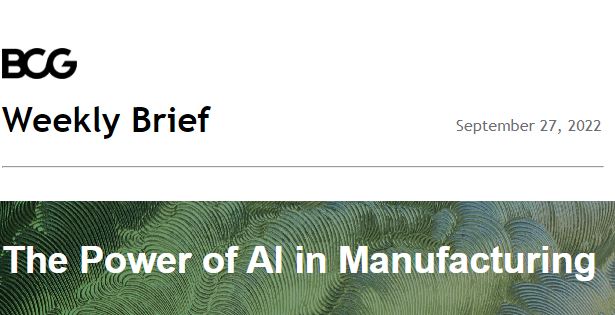
To BCG’s network around the world,
Manufacturers are under considerable pressure: rising economic uncertainty, labor challenges, fluctuating energy and raw material prices, and supply chain disruptions. The traditional means of driving productivity are drying up, and it’s getting harder to uncover the next wave of value. This is where digital and AI come in, powering a new era of continuous improvement for bold companies ready to drive a step change in performance.
The value that AI can unlock for manufacturers is significant. A 2% to 5% increase in revenue through higher throughput and yield. A conversion cost saving of 10% to 15%. Better customer service and quality, more sustainable operations, and improvements in safety and employee engagement. Despite so much potential, however, only 8% of manufacturers have scaled even one digital or AI solution across their entire plant network.
The 10-20-70 Path to AI at Scale
What’s holding manufacturers back?
Many put too much weight on the algorithm and not enough on the processes, organization, and skills and capabilities of the people involved. At BCG, we refer to the 10-20-70 formula for success in scaling digital and AI. Ten percent of the effort should concentrate on algorithms, 20% on the data foundation and technologies, and 70% on embedding AI into key business processes, new ways of working, and enabling the workforce.
In other words, organizations need to invest more than twice as much in process and people as they do in tech, data, and algorithms. This includes fundamental reskilling and upskilling along with the development of suitable organizational models and new KPIs and incentives. It’s also critical to bridge the historically distinct IT and OT (operations technology) groups, since data from both systems are essential to the development of a scalable platform.
Companies should start by zeroing in on key value drivers and pain points that are specific to their business. AI and digital offer extraordinary opportunities to solve today’s complex manufacturing challenges, benefits that most organizations have yet to take full advantage of:
- In manufacturing planning, for example, AI and digitization can help companies improve site production scheduling, greatly enhance visibility into network operations in real time, and help remove bottlenecks in production.
- For the production process itself, companies can use AI and machine vision (the technology and methods that provide automated inspection and analysis) to enable a new wave of automation. Digital and AI can also drive early warning systems, alerting management before issues arise and avoiding unexpected shutdowns.
- Supply chain challenges can also benefit from AI solutions, including emissions tracking and abatement, advanced demand forecasting, digitization of traditional sales and operations-planning processes, and network optimization.
- These technologies can provide benefits to those who support the production process, too, including predictive maintenance to reduce costs and improve uptime and the digitization of routine tasks.
AI in Manufacturing Delivers Measurable Value—One Example
Some companies are getting the formula right—and reaping rewards. A North American fast-moving consumer goods company, for example, was facing labor challenges, exacerbated by the pandemic, and was managing numerous plants with low digital maturity. With a bold vision to transform operations through AI, the company launched an 18-month end-to-end journey that incorporated strategy, digital solution development, and capability building, along with investments in a data platform as a foundation.
The manufacturer created a new team with more than 15 fully trained FTEs at the helm, resulting in improvements in worker safety, product safety and quality, employee engagement, customer satisfaction, and sustainability. The effort included a dedicated change program to build momentum and a new role in the plants to drive adoption of these tools. The effort has delivered $100 million in value already and is on track to generate an additional $100 million in the upcoming fiscal year, equivalent to a full point increase in profit margin.
The potential is exciting. With a holistic approach, AI can solve some of today’s most persistent problems in manufacturing, tapping into new opportunities that allow companies to reshape and deliver on future goals and ambitions.
Please see below for related content.
Until next time,
 |
Christoph Schweizer
Chief Executive Officer
| Further Reading Why AI-Managed Supply Chains Have Fallen Short and How to Fix Them  The root cause of the problem lies not with technology but with how and where companies are applying it. READ MORE → The Automation Revolution in Manufacturing  The technologies needed to overcome many longstanding barriers to shop floor automation—and the skills needed to use them in combination—are finally available.READ MORE → Organizing for Digital Operations at Scale  It’s not enough to establish the right organizational structure. Companies must also attract and retain digital talent and overcome the limitations of legacy IT systems.READ MORE → |
| Boston Consulting Group 200 Pier Four Boulevard Boston, Massachusetts 02210, USA  |





